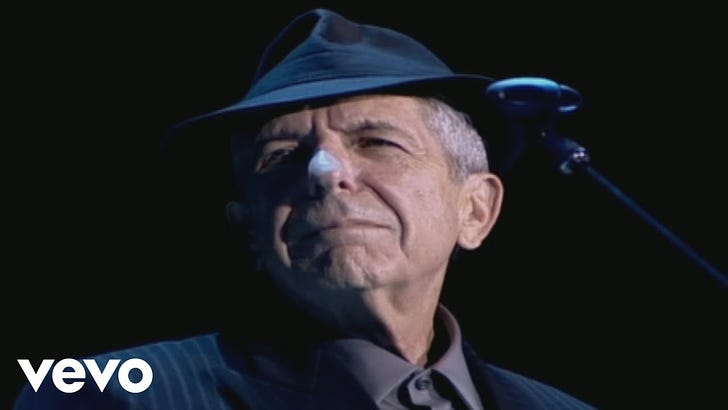“I've Been Talking About This Catastrophe for a Long Time"
My favorite Leonard Cohen album has always been The Future (1992). It was his darkest, until the threat-fulfillment You Want It Darker, which was released just before his death. I wrote about the title song to that 2016 album, with its invocation of "hineni," which means "Here I am, Lord," for the Forward's list of the 150 greatest Jewish pop songs. It was No. 2, followed only by Bob Dylan's puckish take on Abraham's intended sacrifice of his son Isaac, the title song of Highway 61 Revisited. The old, weird America of folk song is no match for the weird Old Testament.
The Future has reinforced relevance now, as war envelopes Eastern Europe, especially in a handful of songs, and America's democratic values are tested as never before. "Democracy" features the line "Democracy is coming to the U.S.A." It was kind of humorous then. This visionary Canadian songwriter explains why the then-recent fall of the Berlin Wall would not mean democracy in Eastern Europe, but maybe it would help move the American "experiment" forward. If he only knew . . . And of course, the title song has the most disturbing earworm in Cohen's tower of song, "I've seen the future, brother, it is murder." In conversation, he said with excessive modesty his songs have a shelf life of around 30 years. It's now 30 years since The Future and "The Future" were released, and this one, I'm afraid, has little chance of going out of style.
Like my favorite Cohen projects, the darkness of The Future is countered by the flickering candles of hope illuminated by the music, and by Cohen's acute connection to spiritual sustenance–at least his awareness that such a phenomenon might exist. On November 12, 1992, the courtly and dapper Cohen and I met in suite in the Righa Royal Hotel in Manhattan. Excerpts from our revealing conversation follow:
WR: I UNDERSTAND 'THE FUTURE' TOOK FOUR YEARS TO MAKE?
LC: I'm embarrassed to tell you some of the songs took even longer to finish. For instance, "Anthem" I've prepared for the last three records and rejected at the final moment. I don't mean sketched out: I mean, recorded with overdubs, strings, and choirs, rejected at the final moment for not being The Song. Most of the songs have gone through those radical reworkings. There are people who write great songs in the back of taxicabs . . . I have to get to a point where I can defend every word. And every line. It seems to take a long time.
WR: THE FIRST TIME ONE HEARS "DEMOCRACY" WHEN YOU GET TO "DEMOCRACY IS COMING TO THE U.S.A.," IT'S A PUNCHLINE THE LISTENER IS NOT PREPARED FOR.
LC: I began to write it when the events in Eastern Europe [fall of Berlin Wall, end of the Soviet Union] began to indicate there was a democratic resurrection. I wrote in one of the 50 or 60 alternate verses, "It ain't coming to us European stye/Concentration camp behind the smile/It ain't coming from the East, with its temporary feast/as Count Dracula comes strolling down the aisle." (c) reserved for The Estate of Leonard Cohen, 1990, 2016, 2022, no infringement intended.
"I thought, it's not going to happen there, but it is going to happen here. I mean, we're right on the edge of it here; it hasn't happened yet, we're at the very idea that democracy really is the religion of the West, and maybe the first great religion, in that it affirms other religions. I was not unaware of the ironic impact of saying, 'democracy is coming to the U.S.A.' I can't keep my tongue in my cheek that long."
WR: DID AMERICANS UNDER-REACT TO THE FALL OF THE BERLIN WALL?
LC: I think I was in Montreal when the wall went down, I don't have any expectations along those lines. I tended with my naturally grim philosophy to be more pessimistic about the consequences. It was then I wrote those lines [from the song "The Future"] "Give me back the Berlin Wall," if you could see what's coming next, if you could read the hidden text, you'd say, "give me Stalin and St. Paul. "
WR: DID YOU EXPECT A NEO-NAZI RESURGENCE?
LC: The reason that the whole of Europe, especially towards the East, has been governed by dictators for most of recorded history, is that it's the only way these societies can coordinate their activities, and monitor the hatreds of these groups that have been living next to each other for centuries. I don't think it's particularly fertile ground for democracy."
WR: I'M INTRIGUED BY THE SONG 'WAITING FOR THE MIRACLE.' THE LINES: “YOU WOULDN'T LIKE IT HERE/THERE IS NO ENTERTAINMENT AND THE JUDGEMENTS ARE SEVERE." I HATE TO ASK LITERAL QUESTIONS ABOUT SONGS, BUT WHERE IS "HERE" IN THAT SONG?
LC: The song begins on one side of waiting, and moves to the other side of waiting. People who are bitten by this particular kind of bug, where meaning has evaporated, and significance has dissolved . . . many people confess to me that they inhabit this kind of landscape, where nothing has much taste. I mean, they're not selling 50 million Prozac pills a week for nothing; we are undergoing some kind of nervous breakdown. And it's coming from the point of view of that nervous breakdown and beyond that the song is written: 'You wouldn't like it here, baby.' But because it's a song, and it's a hot little track, and the body moves with the mind, as you listen to it, the song can progress from that humorous and grim position, to the other side of waiting, which is liberating.
"This is a sensibility which is contagious. When I've had to justify whatever half-baked philosophy is behind my work, whenever I present my rap on it, journalists' eyebrows have been raised, but they don't go up so high anymore. I've been talking about this catastrophe, this interior catastrophe for a long time. I find a lot more hospitality to this idea now. So all the songs are about that position, but I think treated vigorously, and if I may say so, cheerfully."
WR: THIS NOTION HITS ME WHERE I LIVE.
LC: You're shattered! We're shattered for some reason. How to negotiate yourself from one moment to the next to the next seems to be the problem. That's why I can't answer questions about strategies, or career. You do your best, you try to keep the boat afloat . . . But there really does seem to be a lot of flak, a lot of missiles in the air. Don't wait for the external event, the internal event has already occurred.
WR: YOU'RE MILDLY AGORAPHOBIC?
LC: That's true, and sometimes more than mildly.
WR: HOW DOES IT MANIFEST ITSELF?
LC: I tend to get shattered as I bring a project to completion. It seems I have to go someplace that's a very rigorous kind of laboratory when I do this work, and I have to discard versions of myself, and versions of the songs until, as I said, I can defend every word, every line. But that place often involves a real shattering of equanimity, or of balance. But speaking man to man, to be able to produce a version that I can wrap my voice around, where I don't choke on the dishonesty of the language or the music I'm producing, I have to go to this naked and raw place, and it usually involves the breakdown of my personality, and I flip out. I'd like to write humorous reportage about the predicament of the artist, but at times like that, I can barely climb an exterior staircase. I get vertigo. I can't go into crowds, I don't want to leave my house, I don't want to leave my room . . . All my relationships collapse, you're in real trouble."
WR: DOES THAT ABATE WHEN THE PROJECT IS COMPLETED?
LC: Yeah, yes and no. You do come back, slowly, and start repairing. You're a grown man, and and you try not to lay this on people who can't accommodate this news about yourself. As you get older and start to accept your manly responsibilities, you try to slowly repair your relationships, or support system, you try the Prozac or Deseryl [trazadone, another anti-depressant] or you go to the synagogue or the meditation hall, you go back to yoga or start running, whatever repair mode is accessible, you embrace."





Fascinating read, Wayne. I’ve been a huge fan of Cohen and of this album, in particular, for a long time. Greatly enjoyed this interview. Thanks for sharing.
Great interview and interviewer. Truly inspiring.